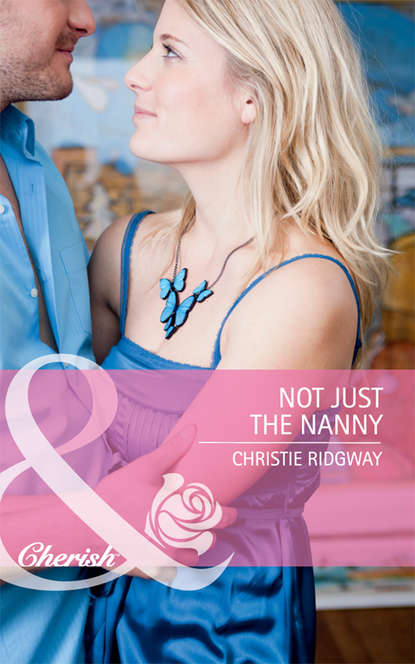
Полная версия
The Stranger's Sin
“From her baby?” Louise arched a skeptical eyebrow. “When will she be back?”
Chase nearly told her to mind her own business, but she clearly liked to gossip. Since she was bound to give her co-workers a cry-by-cry account of tonight’s bring-a-baby-to-work fiasco, it would be best not to alienate her.
“Soon,” he said.
“I certainly hope so,” she said. “A baby needs his mother.”
In Toby’s case, Chase disagreed.
Toby uttered some gibberish, awarding Chase with one of his priceless grins.
“Thanks again for having me,” he told Louise, “but I need to get this happy little guy home so I can get him to bed on time.”
He felt like a politician on the campaign trail, putting the best possible spin on a situation after getting called for a misstep. Damage control, the politicians called it.
He headed for his Jeep before she could ask another question. He’d been facing more and more of them lately, most dealing with whether he and his father were equipped to handle a baby.
It was only a matter of time before somebody guessed that Chase didn’t have a clue where Mandy had gone.
Or whether she was ever coming back.
T HE GLOW OF THE microwave brightened the dark side of the kitchen; Chase hadn’t bothered to turn on a light. He waited for the shrill beep, then opened the microwave door, noting the time on the digital display.
Eleven fifty-six, a good three hours since he’d put Toby down for the night and at least an hour since Chase had turned out his own bedside light.
He’d switched it back on again a few minutes ago.
He removed the mug from the microwave, his eyes drifting to the whiteboard affixed to the side of the refrigerator. It was too dark to read the lines his father had scribbled in black marker but he knew them by heart.
Don’t worry. Home late.
The mystery of where his early-to-bed father had gone paled only in comparison to Mandy’s disappearing act.
Chase heard the mechanical sound of the garage door raising, signaling that he’d soon find out the answer to at least one of the puzzles.
“Hi, Dad,” he said when his father walked into the kitchen a few moments later.
His father’s body jerked, then relaxed. A tall man with a full head of gray hair, he’d nearly shattered when his wife died but lately Chase had seen signs that he was coming back to life. Not only had he gone out tonight, but he’d taken care with his appearance, wearing a new-looking short-sleeved polo shirt with his favorite khakis.
“I didn’t see you there.” Charlie Bradford carried his shoes in one hand, as though afraid the click of his heels on the hardwood would wake up the household. “I thought you’d be asleep.”
Chase held up his mug. “I’m trying Mom’s remedy.”
“Ah, warm milk,” his father said.
Chase brought the mug to his lips, blew on the liquid and took a sip. The thick, chalky taste filled his mouth, and he made a face. “Ugh. As terrible as ever.”
His father chuckled softly. “I never could stand the stuff. Always thought it was better to talk about what’s keeping you up.”
“Is it that obvious?”
“Asked the man drinking warm milk in the middle of summer,” his father quipped.
Chase set the mug down on the kitchen counter. “It’s Toby.”
“Is he all right?” his father asked sharply.
“He’s fine,” Chase assured him, “but I’ve been thinking about that message Mandy left on my cell phone.”
Chase had received the voice mail a few days after he discovered her “miscarriage” was a convenient way to explain away a pregnancy that had never been, not that he’d shared that embarrassing tidbit with his father or anyone else.
He’d met Mandy Smith at the tail end of a year he’d been in Harrisburg attending training school to become a Pennsylvania Game Commission employee. After his March graduation, he’d been assigned a territory that included Indigo Springs. Weeks later, she’d phoned to tell him their single night together had resulted in pregnancy.
What else could he do but invite her to live with him? Had the pregnancy progressed, he would have asked her to marry him. It would have been the right thing to do. Instead he’d been played for a fool.
In the voice mail Mandy had rambled on about leaving Toby, but explained that she wasn’t cut out to be a mother.
“I don’t think she’s coming back for him,” Chase said.
“That could be,” his father said. “That girl wasn’t much of a mother.”
His father should know. During the two months Mandy had lived with them in Indigo Springs, his dad had spent more time with Toby than Mandy had.
Chase drew in a breath, then put into words the conclusion he’d reached while lying in bed. “I need to contact the Department of Public Welfare.”
“No! That’s a terrible idea,” his father cried. “Where’s this coming from? Did something happen tonight?”
“Yes and no,” Chase said. “It’s just that the librarian who set up my speech asked a lot of questions.”
His father put a hand to his head and groaned, then sank into a chair beside Chase. “I forgot about your speech.”
“Yeah, you did.”
“You don’t usually need me on your day off, but I still should have remembered.” He grimaced. “You had to take Toby with you, didn’t you?”
“I tried some of the neighbors but nobody could watch him,” Chase said.
“How was he?”
“Noisy. The librarian took him outside for me, then she quizzed me about Mandy. Turns out Mandy used to come into the library to read magazines.”
“I’m sorry,” his father said, but still didn’t offer an explanation for where he’d been. Odd. His father had to know Chase wanted him to get out of the house and go somewhere besides the river with his fishing pole.
“Where were you anyway?” Chase asked finally.
“Nowhere special.” His father added hurriedly, “Why would some librarian asking questions about Toby make you think you have to go to DPW?”
Chase opted not to repeat the question he’d asked his strangely secretive father. “Because she’s not the only one. Mandy’s been gone for almost three weeks. Sooner or later, someone will figure out we don’t have legal custody.”
“We won’t have legal custody if you go to DPW, either,” his father pointed out. “The agency would.”
“Yeah,” Chase said, “but it’s the right thing to do.”
“The right thing to do,” his father muttered, running a hand over his lower face. “You’re just like your mother. She was always going on about right and wrong, as though it was easy to see the difference.”
“It is easy,” Chase said.
“Not true. What if DPW takes Toby away from us? Think about it, Chase. You work long, unpredictable hours, and I’m sixty-seven years old. Toby’s a normal, healthy baby. Do you know how many couples out there are looking to adopt a baby like him?”
“Toby’s not up for adoption, Dad. I’m thinking we could ask to be his foster parents. He’s lived with us for two months. It wouldn’t make sense to move him.”
His father’s head shook vehemently. “It’s too much of a risk. There’s no way you can know for sure that DPW wouldn’t take Toby away from us.”
That possibility was what had driven Chase to the kitchen in search of the warm milk he couldn’t drink. If Louise Wiesneski were a social worker instead of a librarian, Chase doubted she’d let Toby continue to live with him and his father. She clearly didn’t think much of his parenting ability.
“I know you want to do the right thing, but look at it this way,” his father continued. “The right thing for Toby is to stay with us.”
“We can’t just keep him indefinitely, Dad,” Chase said. “Sooner or later, I need to go to the authorities.”
“Then make it later. Three weeks is too soon to be sure she isn’t coming back.”
“It’s getting there.”
“Okay, then let’s say she isn’t coming back. Mandy told you she didn’t have any family, right? That means she left Toby for you to raise. So find her and get her to give you custody.”
After his father went to sleep, Chase sat at the kitchen table, his hands cradling the now-cooled milk, trying to figure out what to do.
Find her, his father had advised.
The directive wasn’t nearly as easy as it should have been. He’d made a couple of stabs at it already, but he had no credit-card information to trace or phone numbers to track down. He’d checked his phone bills and Mandy hadn’t made any long-distance calls while she was living with him. He’d even taken a short trip to Harrisburg, but the employees of the bar where they’d met claimed not to know her. The clerk at the hotel where she’d rented a room said she’d paid in cash.
Looking back on it, Mandy had been closemouthed about her past and Chase hadn’t spent much time getting her to open up. He’d been too busy trying to get along with her.
So how could he go about finding a woman he didn’t know anything about?
CHAPTER THREE
I NDIGO S PRINGS TURNED OUT to be a picturesque town in the Pocono Mountains, with charming stone buildings lining a hilly main street that provided stunning views of the surrounding area.
The lush green of the valley mingled with the majesty of the mountains and the blue backdrop of the sky. Kelly would have felt as if she’d been transported to the pages of a storybook if she hadn’t been searching for the only person who could keep her out of prison.
The clerk behind the counter at the busy ice-cream shop shook her head and tried to give the color sketch Kelly had done of Amanda back to her.
“Are you sure she’s not at least a little familiar?” Kelly shifted her heavy backpack, repeating the same question she’d used on the string of clerks and receptionists in the stores along the town’s main street. “It’s not a perfect likeness.”
“I’ll be glad to look at it again.” The clerk had a matronly figure and a round, pleasant face, with big eyes that narrowed when she concentrated. After a few moments, she muttered, “Come to think of it, something about her does seem familiar.”
Kelly’s heart gave a hopeful leap. Finally, after hours of frustration, this could be the break she’d been waiting for. She held her breath as though even the simple act of exhaling might ruin the clerk’s concentration. Time seemed to lengthen, and the swirl of conversation dimmed, taking a back seat to the drama.
“I’ve got it!” the clerk said decisively. Her gaze lifted. “She looks like you.”
The air left Kelly’s lungs, the hope that her long shot was about to pay off fading along with it. This wasn’t the first time today Kelly had experienced the same swing of emotions. A half dozen other people had also pointed out the resemblance. Kelly was beginning to understand how the eyewitness had mistakenly picked her out of a photo lineup.
“It’s not me.” Kelly took back the sketch. “But thanks for looking at it.”
“Well, I hope you find her,” the clerk said kindly. “Do you mind me asking why you’re searching for her?”
“I have something of hers,” Kelly said. Before she could expand on her answer, the door banged open, admitting a noisy, laughing family of four.
“I want chocolate chip.” The smaller of the two children, a thin, dark-haired girl of about three years old, skipped up to the counter, flashing an adorable smile. Her mother immediately followed, placing hands on the girl’s shoulders to hold her back.
“You have to wait your turn, sweetie,” she said.
“Why?” the girl asked, eyes big and wide.
As the mother explained, the clerk laughed, then told Kelly, “We’ve been really busy this week with the Fourth of July weekend coming up. Can I get you something?”
Why not? Kelly thought, and ordered a bowl of fudge ripple ice cream. She found a table at the back of the store, shrugged off the backpack and sat down, digging into the ice cream with a plastic spoon while people laughed and talked all around her.
It didn’t dawn on her how hungry she was until she swallowed the first mouthful. The last thing she’d eaten was a package of cheese crackers from a vending machine. When had that been? This morning? Last night?
She truly didn’t remember. Driving her own car to Indigo Springs had seemed too risky, so the Tuesday morning after her Monday arraignment she’d set out for the bus station. Using cash she’d withdrawn from her modest savings account, she’d taken a series of buses. What would have been a five-hour trip had stretched to eighteen, with Kelly trying to catch snatches of sleep during the long night of transfers and layovers.
It occurred to her that by covering her tracks she was acting like a guilty woman. At the very least, she’d violated the terms of her bail, but she didn’t see how the authorities would know she was gone until she failed to show up for her preliminary hearing, whenever that was. Spencer Yates, if he suspected she’d left the state, should be bound by attorney-client privilege not to tell.
In any event, she couldn’t go back to Wenona until she found Amanda, and that might take a while. Nobody who’d seen the sketch had inspired even a glimmer of hope, with the exception of the construction worker with the great smile.
It turned out he hadn’t recognized Amanda, either, which wasn’t surprising. He’d been supervising the construction of a new wing of town hall, his attention divided between a crew putting up drywall and a desperate woman shoving a sketch at him.
She gazed down at her bowl, stunned that it was already empty. Weariness set in from her nearly sleepless night, weighing down her very bones. She needed to summon the energy to pick up the backpack she’d stuffed full of clothes and leave the ice-cream shop. She had only a few more businesses to canvas. Once she did, she’d have to tax her tired brain to come up with a new strategy.
She supposed she could make copies of the sketch and hand them out on the street, but she’d have to include contact information, something she was reluctant to do because she couldn’t shake the feeling the authorities would be looking for her.
The jingling of the bell on the door announcing the arrival of a new customer added to the general hubbub. Kelly looked up, expecting more tourists in search of an afternoon snack.
A tall man in a policeman’s uniform entered the shop. He ignored the ice-cream counter, his gaze sweeping the shop and zeroing in on Kelly. The breath in her chest froze, as cold as the ice cream she’d just eaten. She told herself to remain calm, and reminded herself she’d only left Wenona yesterday. The law couldn’t possibly have found her already. Even her attorney couldn’t be sure she was gone.
The cop played havoc with her rationale, striding directly for her. Her heart stampeded, and she felt like she might pass out.
The penalty for violating the conditions of bail was an immediate return to jail. She imagined herself behind bars, heard the sound of a cell door slamming shut, felt the weight of panic crushing her chest.
He stopped at her table and loomed over her, blotting out her view of everything but him. “I need to talk to you.”
Battling her growing dread, she tipped her chin, fervently reminding herself she was innocent. “I didn’t do anything wrong.”
The corners of the cop’s mouth dipped slightly. “I didn’t say you did.”
“Then why…” She stopped in midquestion, belatedly realizing his uniform of a short-sleeved khaki shirt and dark pants was decidedly different than those worn by the New York policemen who’d arrested her. “You’re not a cop, are you?”
“No,” he said.
She squinted, making out the words on his silver badge. Wildlife Conservation Officer it read. Another term for forest ranger.
Relief saturated her limbs, making them weak. Her brain started to function with more clarity. Even in the unlikely event the cops in New York knew she’d left the state, this was Pennsylvania. If this man had been a cop, he wouldn’t be on the lookout for her.
“Would it matter if I was a cop?” He had an aggressively masculine face with a square jaw, lean cheeks and an outdoorsman’s tan. Short, thick brown hair, lightened by the sun, sprang back from a widow’s peak above assessing brown eyes. She guessed he wasn’t yet thirty.
“No. No. Of course not.” She bit her lip to stop from issuing another denial. She tried to smile but felt her lips quiver. “What did you want to talk to me about?”
He gestured to the sketch on the tabletop. “That,” he said. “Can I sit down?”
“Yes, of course.” She felt like she was on a roller coaster, having survived one plunge only to be ascending another incline, praying this one wasn’t too tall to climb. She turned the sketch around so that it faced him. “Do you know her?”
He picked up the paper, his expression giving away nothing. She wondered who had told him about the sketch. Her guess was the construction worker, who’d probably known more than he was telling.
“I might,” he said. “What’s her name?”
“Amanda Smith.”
He gave no indication he recognized the name. “Why are you looking for her?”
“I have something she’d want back.” She unzipped an outer pocket of her backpack and pulled out a necklace. Fake gemstones of jade, lapis and ruby hung from a thick gold herringbone chain that looked just like fourteen-karat gold. “It’s costume jewelry, but it’s vintage. This one’s exceptionally pretty.”
“Did she give it to you?” he asked.
“Oh, no. I don’t know her nearly well enough for that. In fact, I don’t know her at all.” She was letting his direct gaze disconcert her, and as a result she was almost babbling. She made herself stop.
“Then how did you know to come to Indigo Springs?” he asked.
She regrouped, calling to mind the story she’d concocted on the bus. “She mentioned the town after we shared a table at a really crowded coffee shop. After she left, I found the necklace. The clasp is broken.”
Only the last part was true. She’d found the necklace in the kidnapped baby’s carrier and theorized the baby had tugged it loose. She wasn’t sure whether the necklace belonged to Amanda or the kidnapped baby’s mother, but it provided a convenient cover story.
“Where was this coffee shop?” the forest ranger asked.
The other people who’d heard the story had taken it at face value, asking few follow-up questions. She groped for an answer that would be general enough.
“Upstate New York.”
“Really?” He put down the sketch, rested his forearms on the table and leaned forward, his eyes still fastened on hers. “So you drove all the way to Pennsylvania from upstate New York to return a piece of costume jewelry?”
Stated that way, her story sounded ridiculous and unbelievable. She clasped her hands, feeling sweat on her palms. She made sure to meet his eyes so he wouldn’t know for certain that she was lying. “Oh, no. I happened to be passing through.”
“With a sketch?”
She bit her lower lip so the truth wouldn’t come tumbling out. Her intuition told her the forest ranger could be trusted, but her instincts had failed her in a catastrophic way when she’d run across Amanda and the baby. It wasn’t difficult to understood why the cops had a hard time believing she’d agreed to babysit for a stranger.
This man was as much an unknown as Amanda had been. She didn’t need to justify herself. Kelly tapped the sketch with her index finger. “Do you know her or don’t you?”
“Not as a brunette, as a redhead.” He straightened but kept watching her just as closely. “I have some photos of her I can show you.”
Adrenaline coursed through Kelly. It made sense that a woman who kidnapped a child might also disguise her appearance. She couldn’t keep the eagerness from her voice. “Where is she now?”
“If I knew that, I wouldn’t be sitting here,” he said.
A static-filled voice suddenly came over his two-way radio. He pulled the device from his belt, uttering a quick, “Excuse me. I have to take this.”
The man at the other end of the line said something about a black bear rooting through garbage at a campsite. The forest ranger listened, nodding, frustration chasing across his features. He signed off.
“We’ll have to continue this later,” he said. “Are you staying in town?”
Now that she’d stumbled across a lead, she would be. “Yes. When can you meet me?”
He glanced at the clock on the wall, which showed it was already past three. “How about seven o’clock? My place. I’ll show you those photos.”
He reached into his wallet, pulled out a card and handed it to her. Chase Bradford. Pennsylvania Game Commission. “That’s my home address and telephone number. Do you have a card? A number where I can reach you?”
She didn’t dare give him her cell-phone number and she hadn’t yet checked into a hotel. It seemed likely that a forest ranger would have contacts in the law-enforcement community with access to information databases. He had no reason to investigate her now, but she needed to think ahead and be smart.
“I don’t have a cell phone,” she lied, “but I’ll be at your house at seven.”
He appeared reluctant to leave her, but she sensed he was a man who didn’t shirk his duties. “I didn’t catch your name.”
“Kelly,” she answered automatically before her newfound sense of self-preservation kicked in. “Kelly Delaney.”
“Where are you from, Kelly?”
Kelly Carmichael was from Wenona, New York. Kelly Delaney, who happened to be a college friend who shared her first name and had also majored in education, wasn’t. She dredged up the name of her friend’s hometown from the Christmas cards they still exchanged. “Schenectady.”
If the forest ranger got suspicious and had a friend run Kelly Delaney’s name, he wouldn’t find anything to sound alarm bells.
“I’ll see you tonight, Kelly Delaney.”
After he left the shop, her shoulders drooped and she cradled her head in her hands. She prayed that Chase Bradford would have information that would lead her to Amanda.
Because now, in the eyes of the law, Kelly wasn’t only an accused criminal.
She was a fugitive with an alias.
K ELLY HEARD THE CRIES before she spotted the woman. She sat on a park bench adjacent to a deserted playground, a baby in her arms.
The gray clouds, heavy with the threat of rain, had kept the regulars away. No children scampered up the stairs to the clubhouse or swung from the swings. There was just the lone woman and the baby.
“Shut up!” The woman’s voice, rich with frustration, carried on the breeze. “I can’t take it anymore! Why won’t you stop crying?”
Kelly didn’t hesitate. She veered from the path, toward the playground, walking at a fast clip. “Excuse me, but can I help?”
The woman turned around. She was an attractive brunette about Kelly’s age with tears streaking down her cheeks. Lines of strain bracketed her mouth and creased her forehead.
“Oh, yes.” She stood up and held out the baby. “Could you hold him for just a minute?”
It was a baby boy about three or four months old with blue eyes and light-blond hair, his face red from crying. Kelly’s heart melted. She held out her arms for the baby. “Sure.”
The sky darkened and thunder rumbled, followed by loud voices, one male, one female.
“Where do you want to go to dinner?”
“That Italian place on the corner looked good.”
Kelly frowned, trying to figure out what the man and woman were doing in the park. Where had they come from? And why couldn’t she see them? For that matter, where was the baby and the woman who couldn’t stand his crying? What had happened to the park? All she saw now was blackness.
Realization dawned, and her eyes snapped open. She wasn’t in a park in Wenona at all, but in a room with the shades pulled down, lying on a feather mattress.
She’d been dreaming about stumbling across Amanda and Corey—no, not Corey. The kidnapped baby’s real name was Eric—on that fateful day she’d tried to help out a stranger. If the dream had continued, she would have seen herself agreeing to babysit for a few hours until Amanda pulled herself together.









